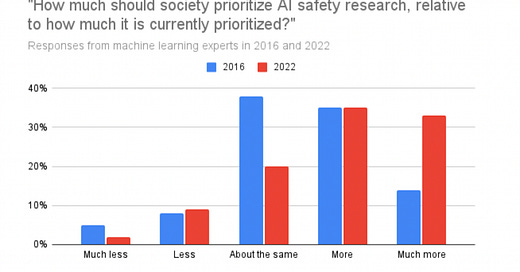What AI Experts Wish You Knew About Artificial Intelligence
Get ready to change the way you think about ChatGPT.
“Mitigating the risk of extinction from AI should be a global priority alongside other societal-scale risks such as pandemics and nuclear war.”
— Statement on AI Risk from the Center for AI Safety, signed by some of the world’s leading experts and leaders in the field
Uh, Happy Halloween?
I have been meaning to do a post for quite a while about a session that I saw at the Aspen Ideas Festival this past June about the potential risks of artificial intelligence and large language models. It was presented by Tristan Harris and Aza Raskin, co-founders of the Center for Humane Technology, and what they said was so unnerving that they literally stopped their presentation about halfway through to invite the audience to take a collective deep breath with them. But, with that said, it also was fascinating and made me feel much more educated about the promise and peril of AI.
So today, in honor of Halloween, I thought I’d share it with you. It’s called “The AI Dilemma” (a play off of the movie The Social Dilemma, in which Harris was prominently featured) and it’s truly a must-watch (or listen) for anyone who’s interested in learning more about artificial intelligence, large language models, chatbots like Bard and ChatGPT, what the future might hold, what the risks might be, and what questions we should be asking. (Eventually I may write some of this up in a post, but for now, I’ll just share the video.)
Speaking of predictions of what might happen in the future, I find this short clip fascinating. It’s Sir Arthur C. Clarke, the English science fiction writer, science writer, futurist, inventor, undersea explorer, and television series host (and, it turns out, co-author of the script for 2001: A Space Odyssey) predicting the conversation we’re having today about artificial intelligence, with an eerie degree of accuracy . . . in 1964.
And now for the cheerful part.
For those of you who would prefer NOT to spend your Halloween thinking about AI-powered annihilation, or who might prefer to be inspired by the potential of these systems instead of freaked out, I also wanted to share a few more uplifting resources and potential applications:
Here’s an interview I did for the medical podcast that I host, Advances in Care, with Dr. Pierre Elias, Medical Director of Artificial Intelligence for NewYork-Presbyterian, in which he explains how utilizing artificial intelligence and deep learning in medicine can help doctors more accurately predict cardiovascular disease and allow them to connect more with their patients. (I left the interview feeling very inspired.)
Here’s an overview of a “Funtervention” workshop that I hosted with Devin McNulty from Funmentum Labs last spring, in which we experimented with using ChatGPT to spark creativity in unusual ways. (Shout-out to the members of the list who attended that workshop — and yes, Devin and I have future funterventions planned for you. Paid subscribers get priority sign-ups!)
Here’s a piece about my adventures experimenting with the AI-powered image-generating software MidJourney — and what it revealed to me about my fellow humans. (Okay, fine, there’s some scary stuff at the beginning about deep fakes, but I promise it gets funnier as it goes.)
Here’s a different panel from Aspen Ideas, featuring Aza Raskin and scientist Karen Bakker (who unfortunately has since passed away), about whether AI might be able to help us understand and communicate with animals (and whether it would be morally okay to do so).
And speaking of animals and Halloween and things that will not give you nightmares, here is my dog in a dress. (Delight.)
To scrolling less and living more,
Catherine Price







It’s worth starting the conversation!
Thank you for posting this. I hadn’t seen the video presentation yet and feel much better informed now.